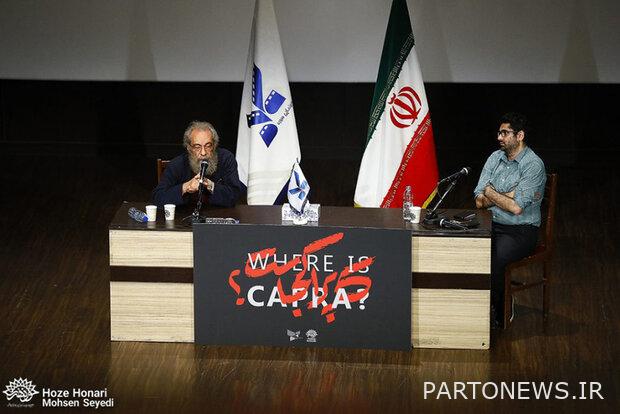What was Iranian cinema from hope to blackmail / Frost’s fight with Avini?

At the “Iranian Cinema from Hope to Blackness” meeting, Massoud Frost emphasized that cinema is not his own social mirror, and spoke about his dispute with Martyr Avini over this issue.
Charso Press: The review meeting of “Iranian cinema from hope to blackness” was held in the presence of Massoud Frost and with the performance of Milad Dokhanchi in the Soura Hall of the Arts Center.
Smoker: The function of the mirror is to negate the status quo
Initially, Milad Dokhanchi, the host of the program “Where is Capra?” He pointed out and said: The main argument of this film is designed on the concept of cinema as a mirror and confirmation and rejection of this statement. Ansari film tries to make this statement problematic and prove how true or false this statement is.
“Where is Capra?” He said. That is, the filmmaker shrugs off his social, political, and cultural responsibilities by hiding behind the proposition of cinema as a mirror or reflection of the status quo.
The presenter went on to describe the state of the mirror, asking what the mirror is basically and what its function is if we want to analyze it philosophically: The mirror is first and foremost something that reflects us. We stand in front of the mirror to reflect on ourselves, and this definition is simple and logical, but the function of the mirror has subtleties because we never stand in front of the mirror to see only ourselves, but expose ourselves to the mirror in order to long for ourselves. To improve.
Emphasizing that the function of a mirror is never a reflection, Dokhanchi clarified: the mirror brings soda and encouragement to get better as a function; The function of the mirror is to negate the status quo. There is a concept in the psychoanalytic literature, and the famous French psychologist talks about the mirror stage. At this stage, the child identifies with his proud self. That is, it identifies with its own ideal self, so in the teachings of psychoanalysis the function of the mirror is to confront us with a better and higher transcendent version of us.
“The mirror not only reflects us, but the mirror produces self-awareness while alienating us from ourselves,” he said. It is in the mirror of the negation of the status quo, and it is supposed to fulfill the desire to be proud, to improve, and to reflect our exalted version. Now, if we attribute all these functions of the mirror to cinema, then we can say that cinema can act as a mirror, but a mirror for which we can imagine all the functions of a mirror.
Dokhanchi added: “Cinema is a cinema that produces self-awareness and can show an ideal version of us, and even shortens us in negligence, and there is anti-hero in it, and wherever there is anti-hero, there must be a hero.” In short, cinema is like a mirror, but considering all the complex functions of a mirror.
Frost: Cinema is not its own social mirror; This was my fight with Avini
In another part of the meeting, Massoud Frost said in response to Dokhanchi’s question: “I believe that cinema is not a mirror and art is not a mirror at all.” In my opinion, if art is a mirror, it is the mirror of the artist. Cinema is the mirror of the filmmaker (the filmmaker I like or dislike); It is clear that the film belongs to him or to the producer or both, and in what period it was made.
Emphasizing that no filmmaker in the history of cinema is his own social mirror, this cinema critic said: “This was an old dispute between me and dear Morteza Avini.” But our cinema today is very much a mirror of the situation; No, the filmmaker was so committed to reflecting on the situation, no! He has no obligation at all, but this level of rent-seeking in the cinema is a mirror of the filmmaker’s situation. This level of irrelevance to the audience and their issues is really new.
He said: “In the serious cinema of the world, you will understand the shape, rhythm and shape of a work belonging to what period of time, but the audience does not understand such a thing from Iranian cinema;” The amount of antiquity of the films says it is the 60s, or the apartment living of the works of the last 20 years shows that the film belongs to the last two decades, that’s it. Iranian cinema has nothing to do with the audience and only one or two films a year may have a serious relationship with the audience.
Emphasizing that Iranian cinema is a mirror of its own people, Frost added: “Iranian cinema, instead of showing the conscious to the audience, shows the unconscious; That is, it shows all its diseases. Not only about us, the art of reflecting the unconscious has its owner, but also in the world. If art were conscious, art would not be created because there is no motivation to write and make what it is aware of.
In the end, this critic considered the message as self-conscious and said: if the filmmaker wants to convey the message, he should go to the telegraph office and it has nothing to do with cinema because art does not give a message, but arouses human senses; What philosophy and everything else is unable to do, so the arousal of the senses is essentially a work of art.

